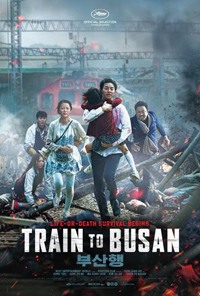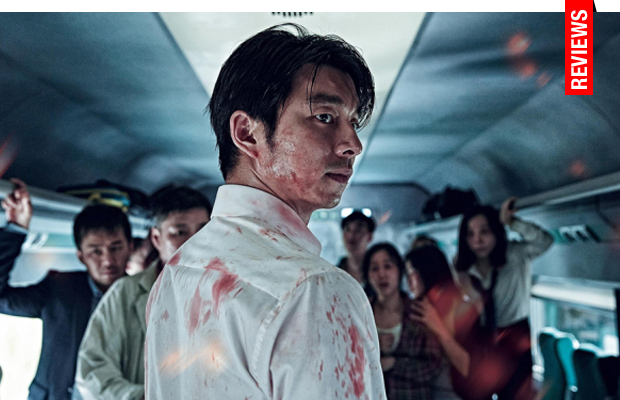Reviews
Train to Busan | Review
Here Comes the Train Again: Sang-ho’s Live Action Debut Heavy on Tropes
 Zombie contagion sweeps over South Korea while a random band of survivors struggle to remain on a train racing from Seoul to Busan as the undead take over, tram car by tram car. With public transportation providing a cross section of social classes, these characters (or study group, rather) is merely another microcosm of capitalistic greed and a queasy understanding of economic privilege. Sound familiar? Director Yeon Sang-ho crosses over from animation (The King of Pigs; The Fake) to make a sort-of sequel with live-action debut Train to Busan, which ends up feeling awfully similar to Bong Joon-ho’s Snowpiercer mixed with the zombie dressing of a World War Z or 28 Days Later. Efficient narrative development leads to significant dramatic tension during its early build up, despite featuring yet another legion of mindless undead subjects converting to nightmare within seconds of exposure. However, this simply isn’t innovative to satisfy audiences hungry for more than the usual set of genre thrills considering these parameters.
Zombie contagion sweeps over South Korea while a random band of survivors struggle to remain on a train racing from Seoul to Busan as the undead take over, tram car by tram car. With public transportation providing a cross section of social classes, these characters (or study group, rather) is merely another microcosm of capitalistic greed and a queasy understanding of economic privilege. Sound familiar? Director Yeon Sang-ho crosses over from animation (The King of Pigs; The Fake) to make a sort-of sequel with live-action debut Train to Busan, which ends up feeling awfully similar to Bong Joon-ho’s Snowpiercer mixed with the zombie dressing of a World War Z or 28 Days Later. Efficient narrative development leads to significant dramatic tension during its early build up, despite featuring yet another legion of mindless undead subjects converting to nightmare within seconds of exposure. However, this simply isn’t innovative to satisfy audiences hungry for more than the usual set of genre thrills considering these parameters.
Wealthy and aloof businessman Seok-woo (Gong Yoo) is ambivalent towards his young daughter Su-an (Kim Soo-ahn), often forgetting to attend significant social functions involving her, such as a recent vocal performance at a school function. The lonely youngster wishes to visit her estranged mother in Busan, and Seok-woo begrudgingly agrees to accompany his daughter out of guilt. But just as they board, a woman scurries onto the train just as the doors slam shut. Infected with a deadly virus which kills her and turns her into a meat-eating zombie, most of the train becomes infected, with a group of survivors holing up in one of the cars until they can get to their final destination, a city which they believe is fortified against the sudden spread of undead. Su-an becomes instantly disgusted with her father as he attempts to save themselves at the potential cost of helping others, including a working class man (Ma Dong-seok) and his pregnant wife (Jung Yu-mi).
The generously ample running time provides plenty of time for Sang-ho’s pointed barbs on class divisions as well as the political statements associated with how the South Korean government handled the MERS virus outbreak a year prior, directly referenced here. There are also some belabored characterizations, particularly with the questionable humanity instilled in Seok-woo’s uber prick fund manager, who initially views his daughter as one more irritation until he begrudgingly agrees (following a schmaltzy guilt trip) to accompany Su-an on the train so she can visit her mother. Before the train’s final destination, he’s been elevated as an unquestionable hero, a man who has managed to bond with members of the lower classes (homeless and blue collar subjects) and vanquish his daughter’s critiques of his cold-hearted selfishness.
To say how he does this exactly would spoil some of the film’s syrupy sentimentality. But the dynamic, including a predictable finale, reveals the major problem with Train to Busan, which initially vaunts over these obstacles during a generally enjoyable set-up—no matter what angle you’re looking at this from, we’ve seen it before. As far as social commentary goes, Sang-ho’s film is sometimes aggravatingly conservative, considering it doesn’t quite demean the elitism which has caused such detrimental disconnection between people.
Obviously, overcoming differences and learning to work together implies a greater possibility of survival (and serves as the film’s main metaphor), but this is only another example of mankind as the innately flawed lesser of two evils on the same (albeit slower) track of moral and physical decomposition as their zombie counterparts.
★★½/☆☆☆☆☆
Los Angeles based Nicholas Bell is IONCINEMA.com's Chief Film Critic and covers film festivals such as Sundance, Berlin, Cannes and TIFF. He is part of the critic groups on Rotten Tomatoes, The Los Angeles Film Critics Association (LAFCA), the Online Film Critics Society (OFCS) and GALECA. His top 3 for 2021: France (Bruno Dumont), Passing (Rebecca Hall) and Nightmare Alley (Guillermo Del Toro). He was a jury member at the 2019 Cleveland International Film Festival.






















